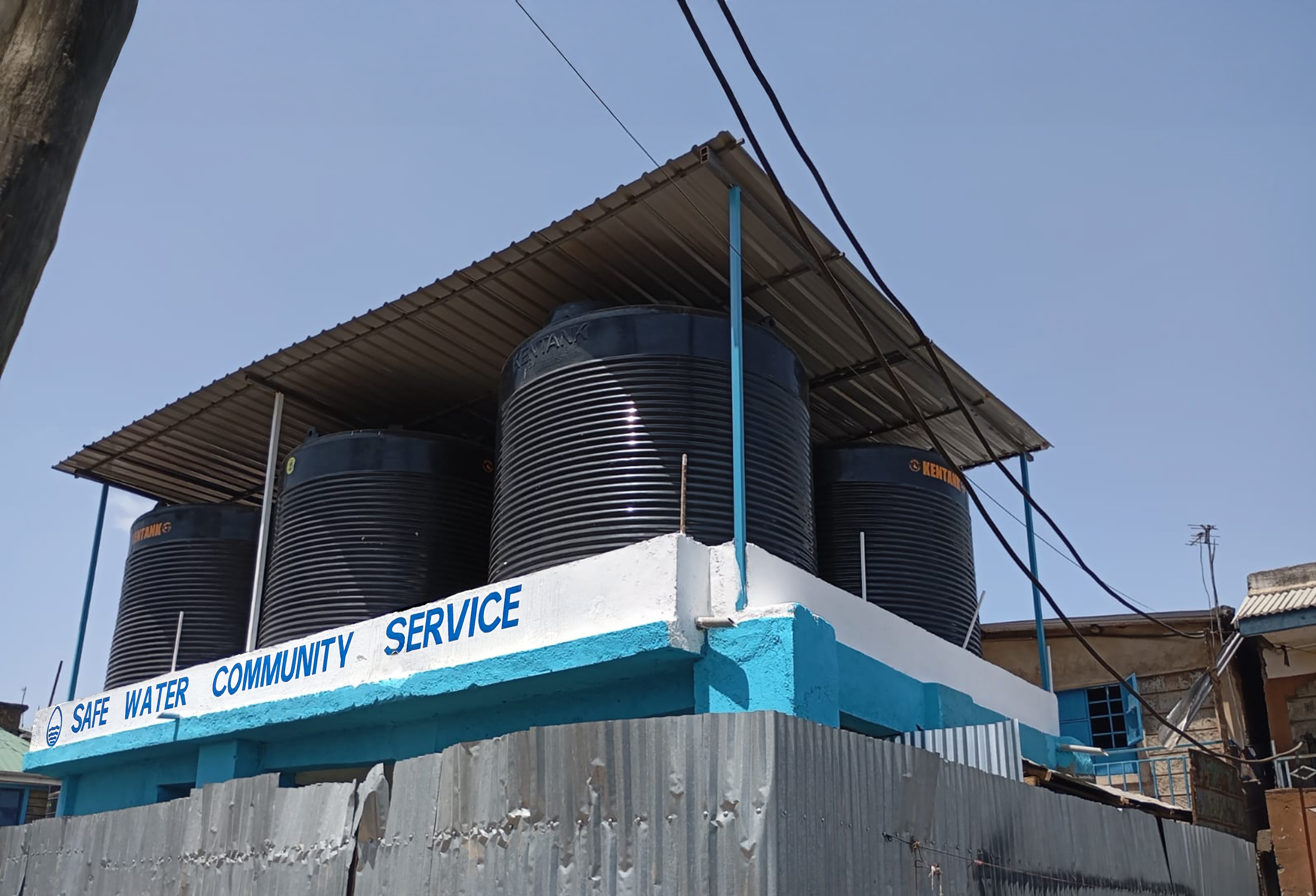
Safe Water
Safe Water Community Service officially launched on March 8th, 2025—International Women’s Day—as a symbol of the vital link between water access and women’s empowerment. It is located in the heart of Mathare, Nairobi’s second largest informal settlement.
Mathare faces acute water insecurity caused by poor infrastructure, environmental pollution, and the dominance of private water cartels charging unaffordable rates. Safe Water aims to provide clean, affordable water while addressing pressing public health, environmental, and gender equity challenges.
The project consists of two phases:
1. Water Service Points - installed and lunched!
2. Bottled water and solar power – designed and raising matching funding
Presently
Water Service Points (Phase 1)
Safe Spaces Organization drilled a productive borehole into the Nairobi City Council water system which now provides the first water source for residents in Mathare. Its water tanks ensure critical storage to the community during times of water shortage.
Water is flowing: One service point is available for filling 20-liter jerricans and another for filling trucks with water tanks.
Hours: open every day 6 am – 8 pm
Ongoing door-to-door community outreach is engaging the community in conversations about water availability and hygiene.
Safe Water is already making meaningful strides toward improving hygiene, reducing water-borne diseases (e.g., Cholera, Amoeba, Dysentry, Hepatitis A), and restoring dignity to daily life through access to a basic human need—clean water.
The water is now closer to the people and it is clean, since we use water guards to also purify the water. Most community water is sold by cartels and is contaminated because the pipes run along the sewerage lines, thus people are prone to the many diseases common in our community. Safe Water has a direct pipe connected to the city council pipe systems, thus clean and safe!
Future
“Safe in Every Sip” Bottled Water (Phase 2)
Safe Spaces Organization is raising 39,500 euros to buy the equipment for purification and for bottling water to meet Kenyan Bureau of Standards (KBS). It will provide clean portable water in 1-liter bottles.
This phase will also provide dependable energy through the installation of solar panel systems and a backup generator. These will power Safe Spaces’ Digital Library and its computer literacy programs along with pumping the water into the holding tanks, running the bottling machinery and powering the Safe Water Community Service office.
Phase 2 is an approved project by Wilde Ganzen foundation in the Netherlands. They will add 50% to the amount Safe Spaces raises.
Interested in helping?
Goals and Social Impact
Phase 1
Improve Access to Clean Water
To establish a reliable clean water supply system that serves diverse customers—including over 3,000 households in Mathare, 200 water trucks supplying neighboring estates, and 500 water cart vendors delivering to local businesses and residents—within the first six months of operation. Having water storage tanks in the community provides assurance that water will be available during water shortages.
Reduce the Burden of Water Collection for Women and Girls
To decrease the average time spent by women and girls fetching water by at least 50%, enabling them to engage in income-generating activities and education.Enhance Public Health through Safe Water Practices
To reduce reported cases of waterborne illnesses in the target area by promoting safe water handling and hygiene practices through monthly health education sessions.Create Sustainable Employment for Young Women
To train and employ at least 15 young women from Mathare in water kiosk operations, management, and health promotion within the first year of operation.
Goals and Social Impact
Phase 2
Improve Access to Clean Water
To encourage better hydration by adding bottled water and supplying it at sporting events, small businesses and community gatherings.Reduce the impact of power outages on education and water delivery
To install solar panel systems and generator backup so that girls can continue computer training and digital library learning and water can continue to be pumped to storage tanks.
The addition of solar panels is part of phase 2 construction. (along with the purchasing and setting up the equipment for purification, labelling and bottling. Plus the small Safe Water office). The Safe Water site is right in front of the Safe Spaces office building. One solar panel system will power the pumping and Safe Water equipment and one will provide power to the Safe Spaces Digital library and office space.















